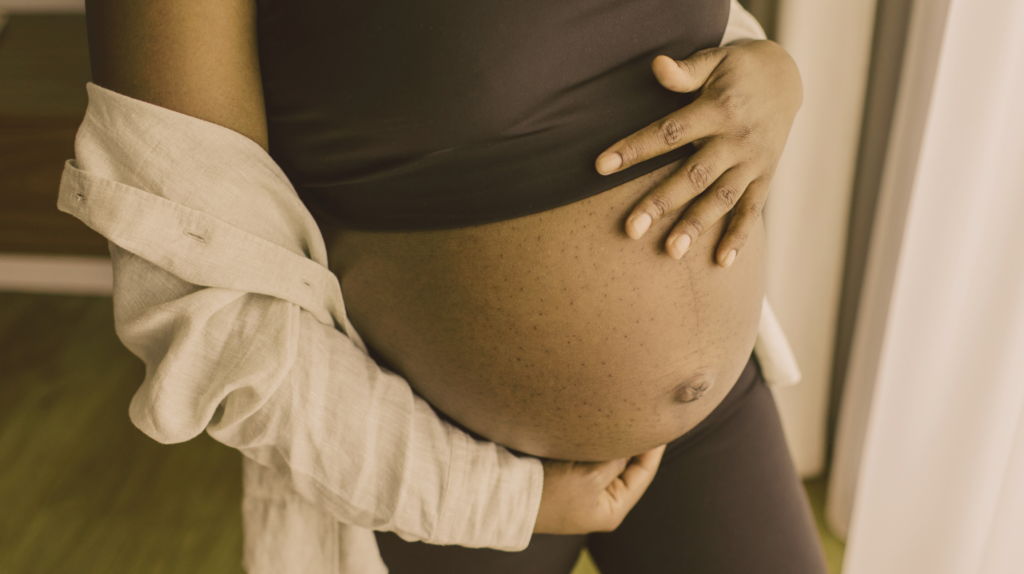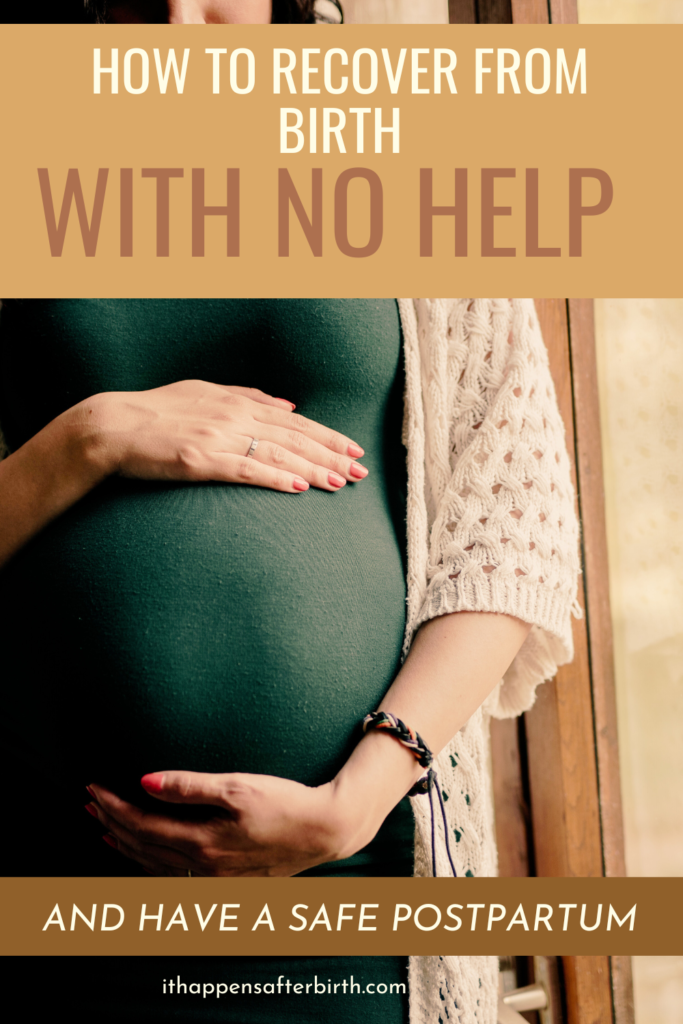How do you safely recover with no help after giving birth?

During the 2020 pandemic, many new parents were left to go through the postpartum transition with little to no in-person support. Oftentimes, this was unexpected.
While that’s one of the only times in recent history we’ve seen a wide scale of postpartum women in the U.S. left with no personal support after birth, it could still be a reality for many expecting women today.
There are many reasons that you may find yourself facing a birth recovery with no help. It could be:
- You have no family or your family situation isn’t good
- You have no close friends nearby
- Your partner is deployed
- Your partner is otherwise unavailable (incarcerated, hospitalized, etc)
- You are a single mom
- You cannot afford to hire support
- Any other personal reason
Regardless of what your reason may be, you find yourself preparing for a situation where it will be just you (or mostly just you) looking after yourself and a newborn baby. This is how you can safely recover with no help when you’re alone after birth.
How do you safely plan for postpartum?
It’s my personal belief that a woman should always have in-person support during and after birth if at all possible. Although our bodies are designed to grow, birth, and nourish babies, we are not meant to be doing all of this completely on our own.
That being said, it’s true that sometimes having that support simply isn’t possible, for any one of the reasons listed above.
So we’re going to talk about how you can plan to have a safe and smooth postpartum transition on your own.
Start during pregnancy
Start your postpartum preparation during pregnancy. I know, you’re going to want to focus on birth preparation, which is important. But set aside time to plan for your postpartum as well.
Find an involved care provider
Whether you are having a hospital birth or a home birth, if you have more than one option, check around to find which doctor or midwife feels most involved and genuinely interested in your well-being. You’ll want someone who you can call if you have any questions about your emotional or physical health, or any questions about your newborn’s physical health.
While Google can be a valuable resource, accurate information can be hard to find, and it does not give you definitive answers. It also cannot provide actual help with an issue/problem you may be facing.
If possible, find a check-in person
If you have people in your life, just too far away to come and support you in person, ask one or two trusted people to be your check-ins. These are people who will call you at designated times to check on how you and your baby are doing. I would recommend a check-in every 12-24 hours through at least the first 2 weeks postpartum.
Have them ask how you’re doing- how you’re really doing. Preferably, this will be someone you can be completely honest with. Have them ask questions like:
- Have you had water today?
- How much sleep are you getting?
- What is your mood (i.e. happy, sad, confused, frustrated)?
- Do you have a fever or unusual pain?
While your care provider will also see you for checkups, they won’t be able to have eyes on you every day, and during the initial postpartum period, that’s very important.
Consider giving your check-in person important numbers that they can call if they notice you’re not doing well. Also think about asking them to request a wellness check on you if you don’t answer your phone or text back within so many minutes of a designated check-in time.
Educate yourself as much as possible
I’m not just talking about mom blogs, either… Although reading other moms’ experiences is good for you too! Read (or watch videos, if you’re a visual learner) about what will be happening physiologically to your body during birth recovery. Learn what can happen emotionally during birth recovery. Learn potential roadblocks to breastfeeding (if you plan on it) and how to solve them. Keep a list of warning signs of postpartum infection. All of this knowledge will be a great help to you, especially as you recover with no help.
If you’re not sure where to start, this blog is a great option!
Other good blogs:
Books:
- The 4th Trimester
- The Womanly Art of Breastfeeding (if breastfeeding)
- The First 40 Days
- Pregnancy, Childbirth, and the Newborn
- This Isn’t What I Expected: Overcoming Postpartum Depression
Videos:
Gather everything during pregnancy
It might feel like a lot to add in when you’re trying to prepare for birth and having a newborn (check out my list of newborn essentials here!), but after you give birth, the last thing you might feel like doing is hauling your newborn and freshly postpartum self out to a store to get last minute items.
Make sure you have:
- A thermometer for you and a thermometer for baby
- Nipple cream (if breastfeeding)
- A form of pain relief, such as Tylenol or after-ease
- Plenty of pads
- Infant Tylenol
- Breast pump
- Bottle and formula
A quick message about formula- if you’re planning to breastfeed, many people will tell you not to have formula in the house, as it may be too tempting to give up breastfeeding during a hard moment. If you are alone during postpartum, I would advise you to take one of two options: have a lactation counselor or consultant on standby who can come over whenever you need them, or have a canister of formula in the house. If you truly reach a crisis moment in breastfeeding, you’ll want to have the formula rather than no other options to feed your baby.
Make Simple Food
Just as it’s important for your newborn to eat, it’s important for you to eat. Food helps to keep up your strength and nourish your body during recovery.
Recovery + newborn takes a lot of time and energy, especially when you have to recover with no help, and there may not be a lot leftover to feed yourself. Keep simple, healthy snacks stocked before birth, and try to make some simple freezer meals to last for at least the first two weeks after birth.
Healthy snacks to keep on hand:
- Olives
- Nuts of any kind
- Cheese cubes
- Dried fruit
- Dried meat, such as jerky
- Coconut water
A few simple freezer meals:
A food-delivery app can also help to feed you when you need it. Although the food will be less nutritious than homemade, the most important thing is that you get fed! The second most important is that it’s nourishing to you.
Learn How To Leave Your Newborn Alone Safely
If you have to recover with no help, it means you won’t have a second pair of arms to take care of your newborn while you do essential things like heating up food, taking a shower, using the bathroom, or even taking a few minutes when you’re feeling too overwhelmed or exhausted to continue. These are all essential things that need to be done, regardless of if your baby wants to be put down or nap that day.
That means that there may be times where you need to leave your (not-napping) newborn alone.
So how do you leave your newborn alone safely?
- Make sure they are in a safe location. Nowhere that they could get themselves into a bad position, and nowhere something else could reach them that isn’t supposed to (such as a pet). The best place is likely going to be their crib.
- Make sure it’s free from blankets, pillows, stuffed animals, or loose toys (both soft and hard). A hanging mobile or toy above their head, that cannot fall, is okay.
- Make sure your newborn is easily within sight or reach. If your home is two levels, consider having a crib or bassinet (if young enough) on both levels.
Your newborn may cry. While not ideal, you do need to make sure you take care of yourself well enough to take care of your newborn. If it comes down to letting your newborn cry or not being able to function as necessary, know that it’s okay and needed to be able to step away for a little while. Just remember…
DO NOT leave your newborn alone or crying for too long. The maximum you should leave them alone is 15 minutes, and that includes keeping tabs on them to make sure they’re okay. If you will need to leave them alone for longer (such as if you desperately need a nap), then you may need to find outside help such as a nanny or trusted babysitter.
Places to find vetted babysitters include:
Other Resources
A good thing in this world of connection is that it’s easy to find support almost anywhere. Although having virtual support isn’t quite the same as having a person right next to you, it’s still a way to help ensure a healthier postpartum recovery!
These resources are worth looking into even if you do have in-person support, but especially if you don’t.
Postpartum Support International has a free helpline for moms who are struggling with their mental health.
La Leche League offers free breastfeeding support (and in some areas, they offer in-person support groups!)
Pacify is an app (free for low-income) where you can video chat with postpartum doulas and lactation consultants.
You CAN do it
Having to give birth and then recover with no help might sound scary, but with the right tools and support, you can do it. And you can do it safely!


Leave a Reply